Now that I’m back on Instagram I find that I’m not nearly as obsessed with being perpetually online as I once was. I go to restaurants and my phone no longer gets first dibs on checking out the spread. Shit, sometimes, I forget to take pictures all together! I visit friends and I realize, 30 minutes in to our conversation, that I left my phone in the car. In fact, And it was in one of those “be present” moments that I stumbled upon a culinary gift known as Kwanzaa Gumbo.
This past weekend, I found myself in Charlotte as a guest of the CRVA and The Dunhill Hotel (thanks y’all!). One of the things I did, while in the Queen City, was visit Chef Oscar Johnson—one half of the culinary duo known as Jimmy Pearls—at his Biscuit Jam pop-up event. While there, I ended up in a very interesting conversation with a gentleman named Lou Gilmore, a former chef (at the Dunhill Hotel, no less) who pivoted careers as the pandemic effected the entire hospitality industry. You can listen to our entire conversation on YouTube but for the sake of brevity, I’ll tell you why his invention struck me like a ton of black, green, and red bricks!
How Can We Make Kwanzaa Lit?
For those unaware, Kwanzaa was created by activist Maulana Karenga, in 1966, as a unity building celebration of African-American history and culture. Based on various African harvest festivals, Karenga aimed to create a holiday that gave Black American’s a chance to celebrate OUR culture and history, rather than simply imitate the Christian practices of the dominant society.
Now part of why Kwanzaa is having a hard time catch on is because of the man who created the holiday. A quick glance at his Wiki page and it’s hard not to understand why certain people want him and everything he stands for to crumble. Regardless of how you feel about Karenga, there is no denying that the holiday has caught on to a certain degree. According to The Atlantic, there are between 500,000 and 12 million people who participate in this seven-day celebration. Personally, know like 4 people who get their Kwanzaa on every year and a handful of individuals (myself included) who dabble in the Kwanzaa sauce every once in a while.
Via a 2017 blog post, I laid out all of the reasons I felt that Kwanzaa was being overlooked in the hierarchy of American holidays. In hindsight, my opinions on how to raise its profile, while earnest, completely missed the mark. To illustrate how glib I was, just look at my my first point: “COMMERCIALIZE IT”. Which, if you know anything about the origins of this week-long celebration of Blackness, is antithetical to why it was created in the first place. The seven principles of Kwanzaa—unity, self-determination, collective work and responsibility, cooperative economics, purpose, creativity, and faith—are to be demonstrated throughout the week not by simply purchasing some stuff off Amazon but by thoughtful creation. So when I met Lou and heard about his gumbo, it felt like the perfect way to make sure the Nguzo Saba are being respected and that people are convening with one another. A more savory ying to my “Kwanzaa Cookie” yang (yet another idea I had on how to get the masses on board).
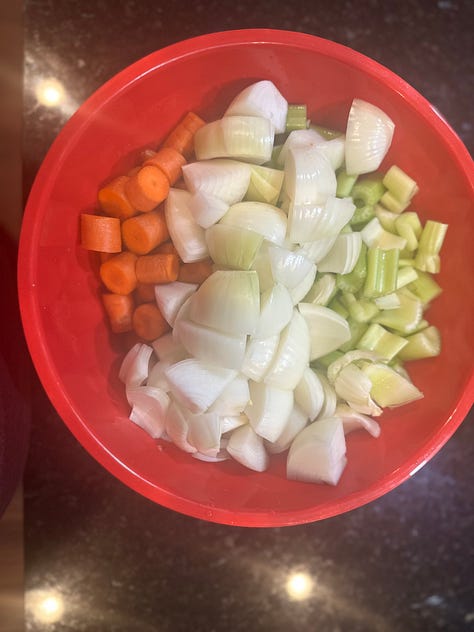
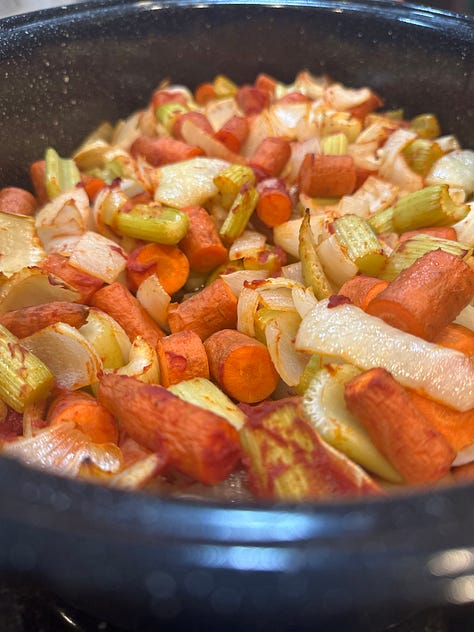
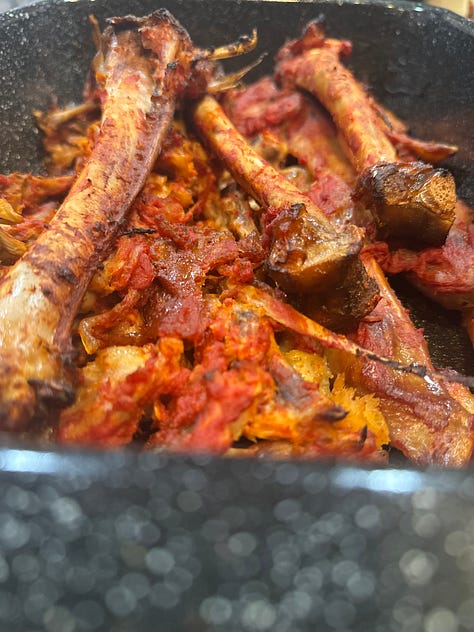
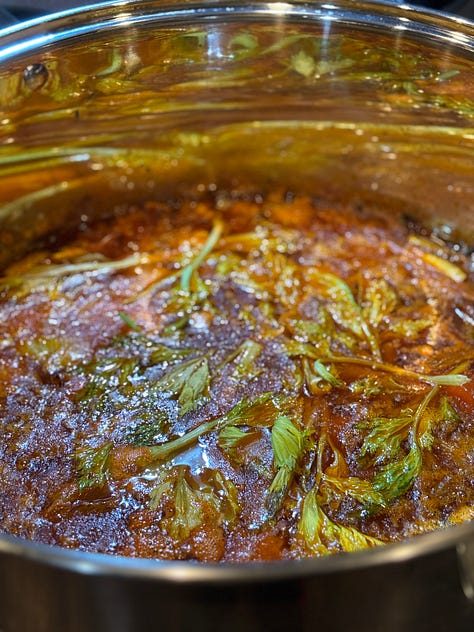
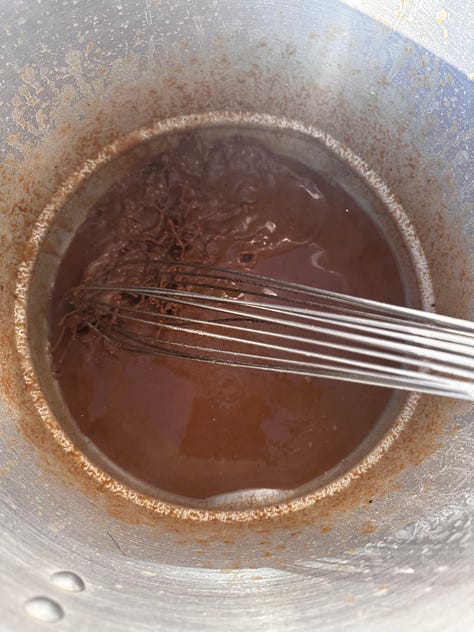
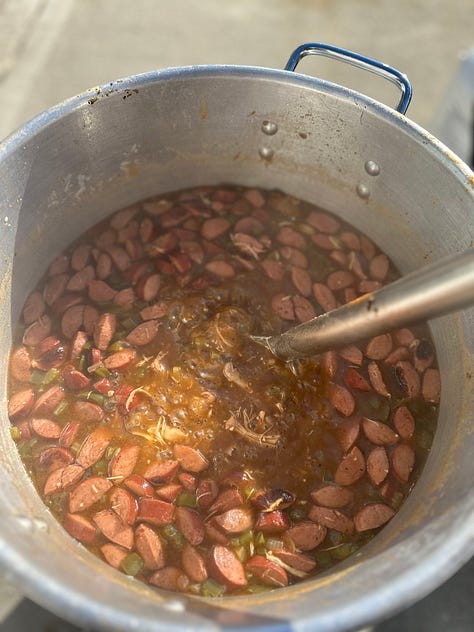
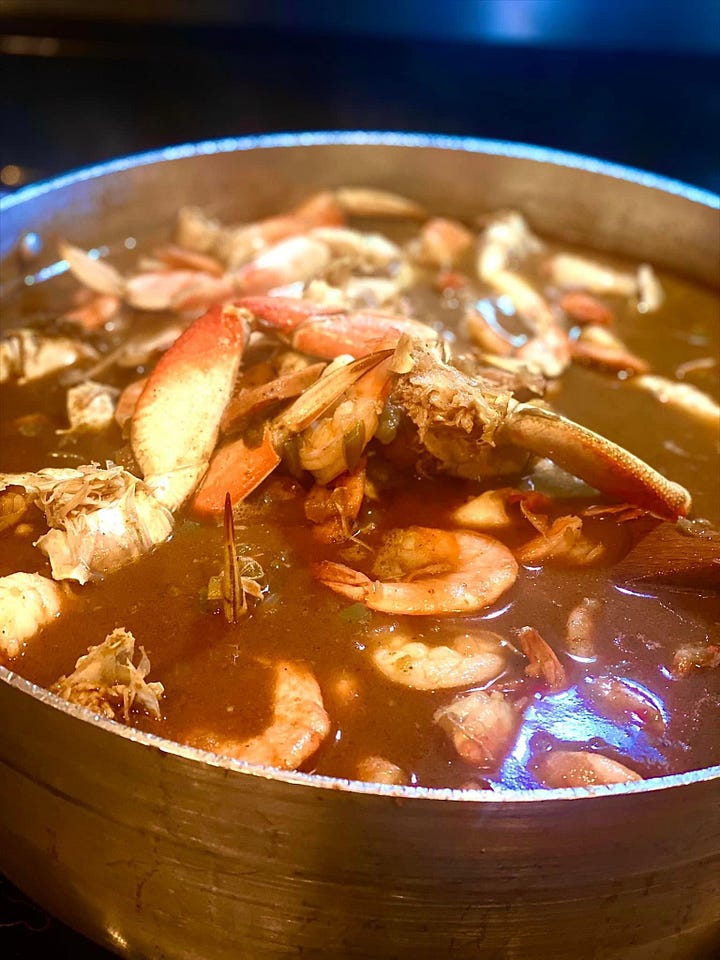
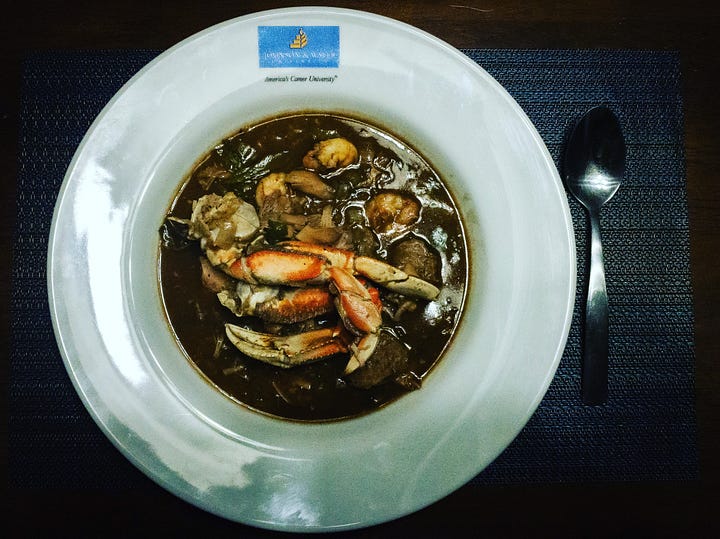
Lou’s gumbo, which takes a full 24 hours to make, is both complex in flavors and approach; a perfect symbolism for all that can be found within Kwanzaa. A self-professed “soup guy”, he is intentional not just about what he puts in it but when the ingredients are added. Even though this is a seafood-forward dish, he doesn’t add shrimp and Dungeness crab until the very end, allowing those with certain allergies to partake without the need of an EpiPen. In fact, the seafood is only added right before serving the bowl. This ensures that only the freshest meats are included in the dish, as opposed to dumping everything in one pot which can make the seafood loose it’s intended texture.
“Making Kwanzaa lit” is not a life or death issue, I know. And given the background of the founder, I can understand why some people would prefer it not to become a thing. But as I’ve gotten older, I find myself more and more attracted to things that bring families together. Am I going through some kind of mid-life crisis? Am I subconsciously wrestling with my own mortality? Am I feeling the draw to the idea of creating my own family as mine is greying? Is that why I felt the need to write about this culturally-specific comfort food. Who knows? Just make sure to tag me in any other Kwanzaa-related food news, if you come across it. If you’d like to watch to our entire conversation, feel free to check it out on YouTube today or just scroll to the bottom of this page.
With Love & Respect,
KJ
BLACK FOOD NEWS is a bulletin of interesting Black food news and information from around the African Diaspora. If you want your Black food news to be added to a future newsletter, please send a press release to news@blackfoodfridays.com for consideration.
Pinky Cole, Baltimore native, returned home to open the newest location of the Slutty Vegan planted-based burger empire. (Black Enterprise)
As promised, here is the full conversation between me and Lou. Please subscribe to the YouTube channel, I’m trying to grow that mug something serious in 2025! Next week, I’ll be posting my conversation with Opera singer, restauranteur, and now children’s book author, Mr. Alexander Smalls!









When I was a kid in the 90’s we used to go to huge Kwanzaa celebrations in Durham. I took those times for granted. Something to think about for my 2025 holiday season!!
Habari Gani! Kuumba is the principle today.
I’ve celebrated Kwanzaa with family and friends for decades now. Gumbo has been a favorite dish to serve on the last day - Imani, for years.
I’m from Los Angeles. For me the cultural aspect is very meaningful as the celebration followed the Watts Rebellion of 1965 and gained popularity and deeper meaning as the years rolled by. Over the years I’ve met several people besides Ron Karenga - now Maulana, who contributed to the celebration as we know it today. In a recent podcast one of them, Akile shares how Malcolm X planted the seeds for the holiday when he advocated creating a days-long celebration after returning from hajj.
I attended My first karamu in NYC in 1977. I remember it well because I had trouble pronouncing “kujichagulia” and because the host served a vegan meal. Another first for me.
I make a dish called Gumbo’s Daddy that’s a West African soup recipe which I say gumbo as we know it is derived from. So yes, I believe Kwanzaa and gumbo were made for each other. It’s Kuumba at its best.